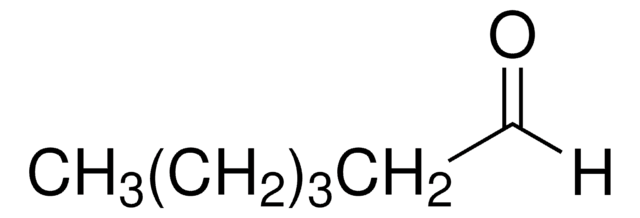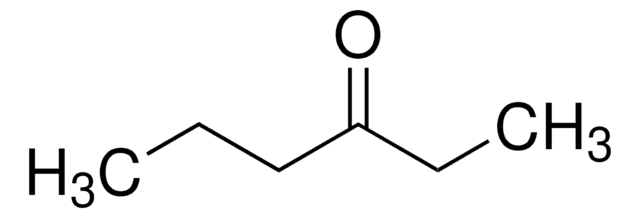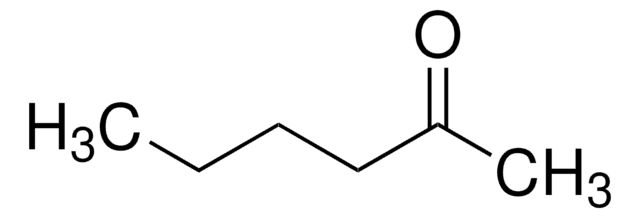128570
2-Hexanol
99%
Synonym(s):
(±)-2-Hexanol, Butyl methyl carbinol
Sign Into View Organizational & Contract Pricing
All Photos(2)
About This Item
Linear Formula:
CH3(CH2)3CH(OH)CH3
CAS Number:
Molecular Weight:
102.17
Beilstein:
1718996
EC Number:
MDL number:
UNSPSC Code:
12352100
PubChem Substance ID:
NACRES:
NA.22
Recommended Products
Quality Level
Assay
99%
form
liquid
refractive index
n20/D 1.414 (lit.)
bp
136 °C (lit.)
density
0.814 g/mL at 20 °C
0.81 g/mL at 25 °C (lit.)
functional group
hydroxyl
SMILES string
CCCCC(C)O
InChI
1S/C6H14O/c1-3-4-5-6(2)7/h6-7H,3-5H2,1-2H3
InChI key
QNVRIHYSUZMSGM-UHFFFAOYSA-N
Looking for similar products? Visit Product Comparison Guide
Related Categories
General description
2-Hexanol is one of the constituent of Porella arboris-vitae extracts which has been determined by solid phase microextraction, gas chromatography-mass spectrometry (SPME GC-MS).
Signal Word
Warning
Hazard Statements
Precautionary Statements
Hazard Classifications
Flam. Liq. 3
Storage Class Code
3 - Flammable liquids
WGK
WGK 1
Flash Point(F)
114.8 °F - closed cup
Flash Point(C)
46 °C - closed cup
Personal Protective Equipment
dust mask type N95 (US), Eyeshields, Gloves
Choose from one of the most recent versions:
Already Own This Product?
Find documentation for the products that you have recently purchased in the Document Library.
Customers Also Viewed
Amit Kumar Tyagi et al.
Evidence-based complementary and alternative medicine : eCAM, 2013, 382927-382927 (2013-02-01)
The chemical composition of Porella arboris-vitae extracts was determined by solid phase microextraction, gas chromatography-mass spectrometry (SPME GC-MS), and 66 constituents were identified. The dominant compounds in methanol extract of P. arboris-vitae were β-caryophyllene (14.7%), α-gurjunene (10.9%), α-selinene (10.8%), β-elemene
Kenji Gomi et al.
Plant molecular biology, 53(1-2), 189-199 (2004-02-06)
An expression profile of genes induced by non-pathogenic Alternaria alternata on rough lemon leaves was obtained by sequencing 500 subtractive PCR clones generated from mRNA of leaves inoculated with the fungus after subtraction with that of non-inoculated leaves. About 6%
Zhi-Xia Zheng et al.
Electrophoresis, 25(18-19), 3263-3269 (2004-10-09)
A novel chiral microemulsion, which involved the use of chiral alcohols as cosurfactants, was demonstrated for the enantiomeric separation of a number of pharmaceutical drugs in microemulsion electrokinetic chromatography (MEEKC). The chiral alcohols investigated were optically active 2-alkanols, with the
S J Crosbie et al.
Human & experimental toxicology, 16(3), 131-137 (1997-03-01)
1. The in vitro metabolism of n-hexane was studied in rat liver, lung, brain and skeletal muscle microsomes and in microsomes prepared from cell lines expressing human cytochrome P-450 2E1 or 2B6. The hydroxylated metabolites of n-hexane were quantified by
J K Alifimoff et al.
Anesthesiology, 66(1), 55-59 (1987-01-01)
The Meyer-Overton rule has been interpreted to mean that general anesthetics act at a nonpolar site, either in a lipid bilayer or a protein. Optical isomers, also called enantiomers, are pairs of compounds with the same molecular formula and functional
Our team of scientists has experience in all areas of research including Life Science, Material Science, Chemical Synthesis, Chromatography, Analytical and many others.
Contact Technical Service











